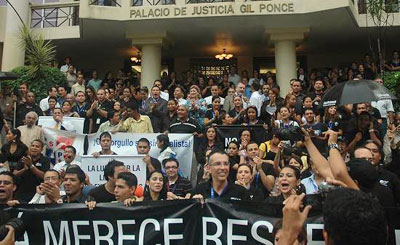New York, October 7, 2010–A Panamanian court of appeals has convicted two TV journalists of criminal defamation and banned them from professional work for one year, news reports said. While President Ricardo Martinelli said he would pardon the journalists, the Committee to Protect Journalists said today that lawmakers should repeal all criminal penalties for defamation.
The case stems from a 2005 story, aired by the national broadcaster TVN Canal 2, alleging that Panamanian immigration officials were taking part in human trafficking. Two officials named in the story filed a defamation complaint against Sabrina Bacal, the station’s news director, and Justino González, the reporter on the story, Panamanian press reports said. In separate rulings in February and March, two lower courts dismissed the charges against the reporters, Bacal told CPJ.
But in a ruling dated September 28 and made public on Monday, an appeals court in Panama City overturned the lower court decisions and barred the reporters from working for one year. The court also ordered Bacal and González to pay a US$3,650 fine or be subjected to a one-year suspended prison term.
Facing criticism from the local press and human rights defenders, Martinelli offered a full pardon on Wednesday, according to a government statement. The issuance of the pardon was still pending as of today.
“While we welcome President Martinelli’s decision to pardon our colleagues, we urge local authorities to carry out legal reforms to fully decriminalize defamation,” said Carlos Lauría, CPJ’s senior program coordinator for the Americas. “Criminal defamation provisions are seriously inhibiting the ability of local journalists to report the news, and Panamanians’ right to be informed.”
Earlier this year, veteran Panamanian journalist Carlos Núñez López served 20 days in prison in connection with a 2008 criminal defamation conviction, CPJ research shows. A property owner alleged he was defamed in a story about environmental damage in Bocas del Toro province.
There is a growing consensus among countries in the region that reporters should not be jailed for criminal defamation. The Argentine Congress repealed criminal defamation provisions in its penal code in November 2009, while in April 2009 Brazil’s Supreme Federal Tribunal annulled the 1967 Press Law, which had imposed harsh criminal penalties for libel and slander.
Panama has only partially decriminalized defamation. Under a May 2008 reform, defamation of high-ranking public officials is no longer subject to criminal sanctions. But other criminal defamation provisions remain in place. The TVN Canal 2 case would be subject to criminal defamation even now, for example, because it did not involve senior officials, said Miguel Bernal, a Panamanian lawyer who handles press freedom issues.
